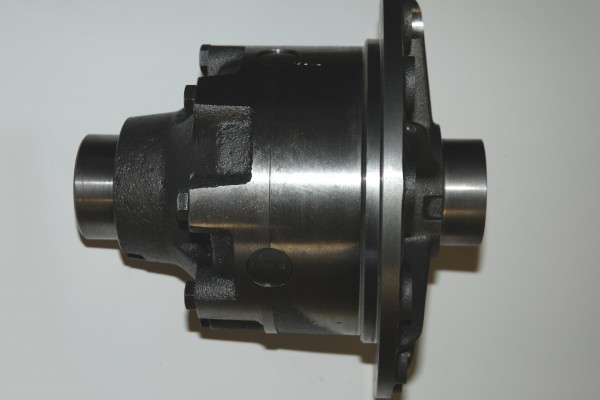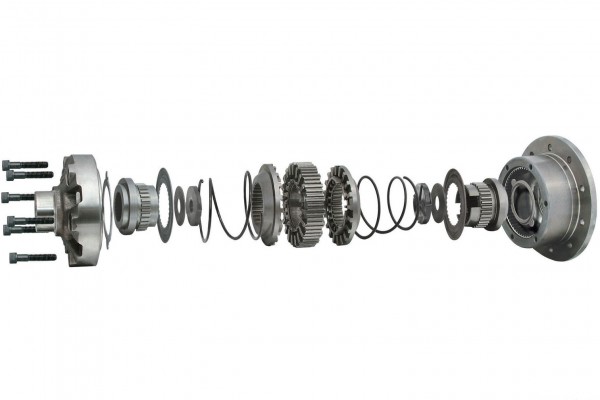Back in the day, if you needed the toughest, most-capable differential on the street, you ran a Detroit Locker. When you want the same kind of differential today, the choice is still a Detroit Locker. It’s the most durable and dependable locking differential available.
The Detroit Locker is an automatic locking differential that is designed to lock both wheels of the rear axle together when torque is applied. It acts much like a spool that solidly connects both wheels together. In a turn, the unequal speed of the wheels forces the Detroit Locker to disengage. Simple and effective.
A Little Locker History
The Detroit Locker was initially called a “Thornton NoSPIN Differential.” Ray Thornton patented it in 1941 as device for use in six wheel (tandem drive) truck applications. The NoSPIN was manufactured by the Detroit Automotive Product Corporation and was used on American military vehicles during World War II.
After the war and into the 1960s, the Thornton NoSPIN was original equipment on light and medium duty trucks. That’s right about when it got the Detroit Locker nickname—and when racers and high performance enthusiasts started to take an interest in it. They used the Detroit Locker on everything from road racers to NASCAR roundy-rounders and land speed record cars. In the late 1960s, some Ford performance cars had the Detroit Locker as a factory option. And to no one’s surprise, the Detroit Locker was found in cars at virtually every drag strip in the nation.
How It Works
A Detroit Locker’s major internal pieces are the side gears, outer springs, driven-clutch assemblies, spider assembly, and center cam. The center cam is held in the spider assembly with a snap ring, but it is free to rotate. The spider assembly takes the place of spider gears found in a conventional open differential.
The key to the unit is the series of teeth found on the spider assembly and the driven clutches on either side of the spider. The driven clutches ride between the side gears, which are splined to fit the axles and turn at the same speed as the axles. When a vehicle is under power and moving forward, both axles are locked in position and turn at the same speed. This means each driven wheel is getting approximately the same amount of traction.
A Detroit Locker will disengage when you take a corner. During a turn, the outside wheel must travel a distance greater than the inside wheel. This causes the wheels to turn at different speeds. The teeth on the Detroit Locker’s spider and driven-clutch assemblies are cut at a negative angle. Here the center cam (inside the spider gear) locks into position and acts as a ramp to disengage the driven-clutch teeth from the spider gear. This allows the outside wheel to rotate faster around the corner. Once the driven-clutch rotation equalizes and both wheels are traveling at the same speed, the exterior springs force the teeth to mesh, or lock. That’s why a Detroit Locker sounds and feels like it’s locking and unlocking when you’re turning.
In the old days, the Detroit Locker got a reputation from clunking and banging as it engaged and disengaged. Nobody cared because that meant you drove a really serious car. Today’s Detroit Locker will certainly let you know when it locks and unlocks, but it’s not quite as severe as the old style differentials.
In 2005, powertrain giant Eaton Corp. purchased Detroit Locker’s parent company and greatly expanded the offerings. Today, you can get a Detroit Locker for Ford 9- and 8.8-inch, Dana 60, Dana 44, Chrysler 8 3/4-inch, and GM 10-bolt and 12-bolt axles at Summit Racing.
Detroit Locker FAQs
Can I use the stock bearings?
In most cases the Detroit Lockers work with the factory (stock) bearings. The exceptions are: 10-bolt 8.5\8.6 GM axles, “Performance” Dana 35 and 44 axles, and GM 12-bolt with 35-spline axles. No other special setup is required.
When I step on and off the gas pedal, I hear the unit make a “clunking” noise. Why?
Because Detroit Lockers have backlash or “slack” between the drive and driven teeth, you will hear noise in everyday use when you take corners and go from drive mode to coast mode. With the vehicle on the ground and the transmission in neutral, you will have one-quarter to one-third of a turn of lash in the driveshaft. This is completely normal.
How much horsepower and torque will the Detroit Locker take?
There are many factors to consider when determining if a specific differential is right for your vehicle. Horsepower and torque are important factors. However, the weight of the car, tire height/width, the terrain and suspension are all important. For example, a setup that uses street tires will live longer because both tires will break loose and spin before any real strain is put on the unit. But as the tire gets wider, the stress on the unit increases because the traction is greater. But keep in mind that the Detroit Locker is the strongest unit sold today and has been for many years.
Can the Detroit Locker be used in front axles?
Yes it can, but you must have lock-out hubs and they MUST be unlocked for on-road driving so you can steer the vehicle.







Did Detroit ever make a unit to fit a 10 spline Jeep 44?
To our knowledge, they have not made any 10 spline offerings.
Just FYI, Removed my diff cover this A.M and there is a 10 spline Detroit locker in there. In. speaking with Eaton, they did make a 10 spline. none of those parts will interchange. I did not ask when they were last manufactured, but he did comment that the 10 splines were considered weak
What doi ask for if i buy a detroit locker no spin for my 72 model Dana 44 front axle for my chevy blazer? Is it just a detroit locker no spin with carrier and everything? My rear is a 14 bolt and it used a open carrier will the carrier come with the front locker?
For a detroit, the carrier and locker are one unit.
I found a 1500 Chevrolet that the owner says was ordered from the factory with Detroit’s front and rear. To my knowledge the front diff in a 1995 half ton will not accept a locker let alone come with one from the factory. Any info on this would be appreciated
I first became familiar with the Detroit Locker differential around 1970 when Ford offered it as part of their “Drag Pack” option for select Muscle Cars of the day. Now being offered with the strength and reliability of a high quality Eaton differential, it’s my first and only choice for my upcoming purchase to complete the drivetrain in my 1970 Mach 1 with a highly modified 351 Cleveland engine. Thanks for the well written article.
Can the Detroit locker used for off roading efficiently ?
How can I release a stuck Detroit locker. Did not use much for some years and now one wheel drives only . Will not drive both wheels . Tried reversing and driving in circles etc . Anyone with a good fix for this?
I have a detroit locker rear end in my 1961 Chevy Apache C20, it even has the plate identifying it in the cab on wall behind drivers seat. The only markings I can see is MP 417 stamped in the pumpkin casting. What does that mean or any other information would be greatly appreciated.
Thank you
Hi there, thank you for this informative site. I have a 1949 Chevrolet 3/4 ton (3600 series) grain truck. It has a metal plate on the dash that says:
No Spin Differential
Detroit Automotive Products
Model # E19
Would this have been a GM option , or perhaps dealer installed?
I have a 1975 f250 ranger am satisfied with the performance of it and will be happy knowing that it is reliable.
I have a 1970 Detroit Locker that I was told came in a 70 428SCJ Mustang.I have installed it in my 70 boss 302 mustang after having it taking apart and reviewed.
The problem I have been having is that at every corner I take with the car it chips tires.
It was nice at first,but now has become and annoyance.
Do you have any idea what it is doing this?
I’m synthetic rear fluid, I do not think that it is the problem,but who knows.
Thank you
I have a NOS No Spin Locker part # 275-19. Can you tell me what axle this fits? Thank you.
Jeff Richards,
Like it says in the article:
“Because Detroit Lockers have backlash or “slack” between the drive and driven teeth, you will hear noise in everyday use when you take corners and go from drive mode to coast mode. With the vehicle on the ground and the transmission in neutral, you will have one-quarter to one-third of a turn of lash in the driveshaft. This is completely normal.” & “A Detroit Locker will disengage when you take a corner. During a turn, the outside wheel must travel a distance greater than the inside wheel. This causes the wheels to turn at different speeds. The teeth on the Detroit Locker’s spider and driven-clutch assemblies are cut at a negative angle. Here the center cam (inside the spider gear) locks into position and acts as a ramp to disengage the driven-clutch teeth from the spider gear. This allows the outside wheel to rotate faster around the corner. Once the driven-clutch rotation equalizes and both wheels are traveling at the same speed, the exterior springs force the teeth to mesh, or lock. That’s why a Detroit Locker sounds and feels like it’s locking and unlocking when you’re turning.”
You may also hear your tires chirp when turning a corner with a Detroit Locker installed in a street car. Jeff Richards what you are hearing in normal. Either live with it, only drive in a straight line, or change out the Detriot Locker for something different.
Jim Seisser
Thanks for the explanation,I was aware of it’s behavior and had another one many years ago that clunked like everyone describes,but this only clunks in reverse and just chips tires around corners and doesn’t really clunk when taken corners.
I was just surprised that it was behaving a little differently then what I remember about the original one I had in the 80’s
I’m keeping it
Does the old ( 1970’s)locker require limited slip additive to work properly?
[…] are Detroit locker vs Truetrac. They’ve been around for a while, and whether you’re a weekend racer, a hardcore off-roader, or something in between, they’ve got you […]
[…] ones are Detroit locker vs Truetrac. They’ve been around for a while, and whether you’re a weekend racer, a hardcore off-roader, or something in between, they’ve got you […]
We have a NOS detroit Locker part number 1255-10 B This was in with someBritish Triumph dealers stock Looking to determine the application But have been unable to find old catolog applicationsAny help appreciated
On my 71 j2000 with d44 rear the passenger side axle won’t fully seat. It’s out by 1/2 of bearing race and the axle seal. The drivers axle seated properly.
I had changed gears and everything and added the Detroit Locker. The axles both slid into place. I discovered I had a hot pinion so took it apart to reshim the pinion bearing, now the passenger side axle won’t seat. Im stumped.